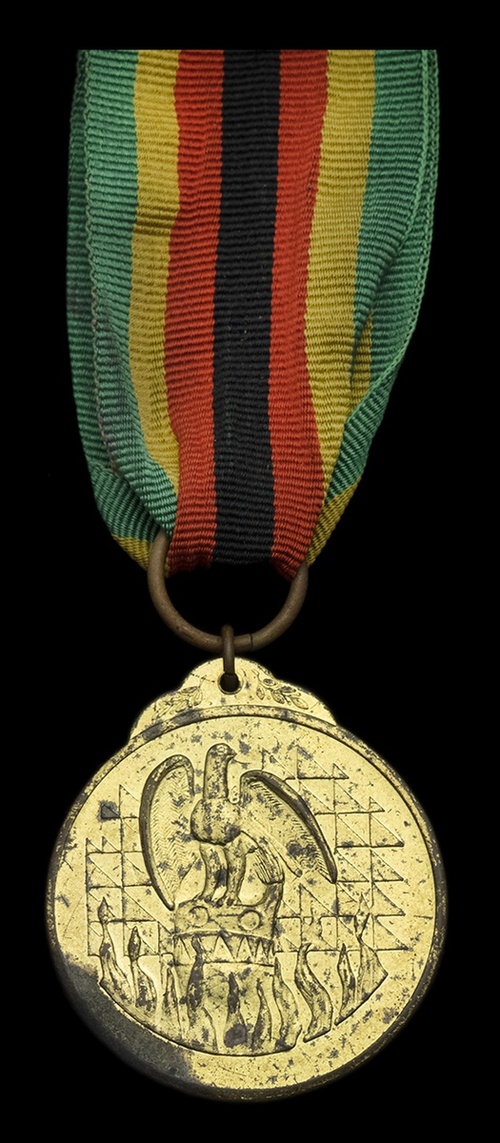Auction: 24003 - Orders, Decorations and Medals
Lot: 167
'War was not a glorious opportunity for boys to go forth and win shining laurels on the battlefield but a ghastly nightmare that ended in ruin and desolation'
(The chilling warning of Major Basil Hill, speaking on the eve of the Second World War)
The Rhodesian Education O.B.E., 'Battle of Amiens 1918' M.C. group of eight awarded to Major B. B. Hill, 13th Battalion, Tank Corps, who commanded a section during the largest Tank Battle of the Great War
The Most Excellent Order of the British Empire, Civil Division, Officer's (O.B.E.) breast Badge; Military Cross, G.V.R., unnamed as issued; British War and Victory Medals (Capt. B. B. Hill); 1939-45 Star; War Medal 1939-45; Territorial Decoration, G.VI.R., Southern Rhodesia, engraved to the reverse 'T/Maj. Basil B. Hill. M.C.', minor contact wear, very fine (8)
O.B.E. London Gazette 1 January 1947.
M.C. London Gazette 30 December 1918.
Basil Benjamin Hill affectionately known as 'B.B.' was born at Kensington, London on 14 January 1889, the son of William and Ada Hill. His father was a teacher and while he was still a child the family moved to Yorkshire where his father took up work as Headmaster of Yarm Grammar School in North Riding. The young Hill was educated their and later at King's College, before joining his father as an Assistant Master as well as joining the Officer Training Corps in the process.
On the outbreak of the Great War Hill was commissioned 2nd Lieutenant on 23 December 1914 and posted to a Reserve Battalion. With the high losses of the Somme Offensive his time came, and Hill was posted to Egypt attached to the West Yorkshire Regiment on 14 January 1916. Later he was posted to the 1/8th Battalion, Manchester Regiment as Acting Captain while a Company commander.
Posted to the 13th Battalion, Tank Corps he commanded a section during the Battle of Amiens, what was to prove the largest tank engagement of the war. This formation went into action in support of the Canadian 4th Division on 8 August 1918 they were to secure the villages of Maucourt, Chilly and Hallu. Hill's formation was ordered to guard the left flank which would be open to enemy fire.
It had been believed prior to the battle that Lihons Ridge was held by the Australians however the advancing British found to their cost that it was not when several machine guns opened fire from the feature. Hill, guarding the left hand flank led his section forward to deal with them, silencing the enemy and advancing as far as the old trench system before being forced to ditch. His actions allowed the Australians to advance and take their objectives.
The Battle of Amiens was a major success for the Allies and precipitated the German retreat which eventually ended the war. Hill was to be in action again with 13th Battalion, notably at Epehy where he was commanding two tanks of No. 2 Section. The war diary notes that the four tanks of this section were detailed to attack The Quadrangle feature which they did under heavy shell fire.
One was knocked out by shelling, another split open by a landmine and all but two of the crew killed. The third was hit twice and knocked out with its crew rescuing their guns and joining the infantry while the last tank, Commanded by a Lieutenant Benson, was caught on the bank and set on fire. Their support immobilised the infantry were unable to advance and the attack proved a failure.
Awarded his M.C. after the war, Hill was posted to the Tank Corps as full Captain on 10 May 1920. At some stage posted to the Reserve of Officers Hill emigrated to Rhodesia where he took up the post of Headmaster of Umtali High School in December 1930. As war again brewed in Europe and around the world Hill made a speech to the school on Armistice Day 1938 about the horrors of war and the need to avoid it. Despite this he was to give another touching speech in 1945 in which he stated:
'We remember with proud thanksgiving those of this school who went forth to fight for the cause of freedom, many of whom, alas, have not come back. Those who gave their lives shall always be remembered. I often hear masters and Old Boys speaking of those who have gone as those who were still alive. They live in the hearts of us all and we remember them with love and affection as they went forth. The deeds wrought in this war by the Old Boys of this school will form a glorious page in the history of the School. They indeed have brought honour and glory to their own names and to the name of the School.'
The school had indeed performed remarkably during the war with the Boys and Masters earning 2 D.S.O.s, 1 M.C.s, 1 American Navy Air Medal, 1 George Medal, 2 D.F.M.s, 2 M.M.s, 7 D.F.C.s and 6 'mentions'. It is not known what role Hill undertook during the war however it is entirely possible he performed a training role. Not long after the war he was awarded the O.B.E. for his dedicated work in education.
Hill died on his son's farm, Leap Year in Marandellas in February 1964; sold together with copied research, photographs and a Zimbabwean Independence medal believed to belong to a relative of the recipient.
Subject to 20% VAT on Buyer’s Premium. For more information please view Terms and Conditions for Buyers.
Sold for
£1,100
Starting price
£1000







